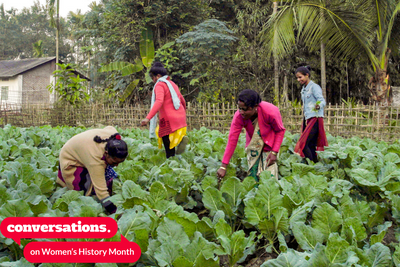How the pandemic is having a dark impact on child marriage
Editor's note: This piece was written by Dr. Yasmin Ali Haque, Representative, UNICEF India
A recent UNICEF report suggests ten million additional child marriages may occur globally before the end of the decade, threatening years of progress in reducing this harmful practice. School closures, economic stress, service disruptions, pregnancy and parental deaths due to the Covid-19 pandemic has put the most vulnerable girls at increased risk of child marriage.
Even before the pandemic, 100 million girls were at risk of child marriage in the next decade, despite significant reductions in several countries in recent years. Girls who marry in childhood face immediate and lifelong consequences. They are more likely to experience domestic violence and less likely to remain in school.
They face an increased risk of early and unplanned pregnancy, in turn increasing the risk of maternal complications and mortality. The practice can also isolate girls from family and friends, exclude them from participating in their communities, and take a heavy toll on their mental health and wellbeing.
In tea estates in Assam, India, UNICEF is working with the Ethical Tea Partnership to prevent child marriage, as part of the wider scope of our Improving Lives programme, which aims to address a wealth of issues facing children living in tea communities. Adolescent Girls Groups have been formed to educate girls about their rights, and to encourage them to share experiences and to speak up when they feel their rights are being compromised - especially when it comes to child marriage.
The 361 Adolescent Girls Groups established across 205 tea estates in Assam are working to educate girls between the ages of 14 – 18, to empower them and to ensure sustainable change. The Groups provide the girls with support from their peers and group leaders, encouraging conversations about child marriage and how to deal with these decisions within their own families.
Tara's story highlights the positive impact the Adolescent Groups can have. After attending her local Group and learning about her rights, Tara was bold enough to question and reject the marriage proposal that was made when she was 14. Now, at the age of 20, she is one step closer to achieving her dream of becoming a teacher, upon graduating from college.
Child marriage within the U.S. is a frightening reality
She said of her experience: "The marriage proposal came for me when I was 14 and I knew it was illegal. I was very worried about how my father would react to my resistance. Then, I knew he would eventually come around".
It's amazing to see girls stand up for themselves, and even more so to see young girls use their newfound knowledge and confidence to support their peers on the important issues affecting their lives. I heard of another girl, Esmita, who did just this when she helped to prevent the marriage of her friend, by persuading her friend's parents not to go ahead with the marriage. Her friend is now following her dream of continuing her education.
Empowering girls to speak up for themselves is a step in the right direction, and it will take a continued and collective effort to bring about real sustainable change. In tea garden households, it is typically the men who take decisions on such matters, which means that boys too need to be educated on the negative impacts of child marriage.
This is where our newly established Adolescent Boys Groups will have a role. With 156 currently in place across the 205 tea estates in Assam, the Boys Groups will have the same aim as the Girls Groups – to educate children on their rights and empower them to become change makers. A key focus of these groups will be to teach boys about a range of issues which impact girls, such as child marriage and menstruation.
With long-held perceptions of child marriage as a societal norm, it is also vital that our programmatic work reaches the older generations living in tea estates so they can begin to appreciate the negative impacts of child marriage, and take action against it. Mediums such as folklore performances and community radio raise awareness and change perceptions around girls' rights, among this group of decision makers.
They have power to mobilize communities around the value of educating girls and ending child marriage.
The pandemic has indeed made our work within tea communities more challenging, but it certainly did not deter us. We've adapted to the situation, and by utilizing WhatsApp and other mobile communication services, we have been able to keep the Adolescent Groups running, ensuring a constant flow of informative content, working to reach and protect the most vulnerable girls living in tea communities.
Since the first phase of the program started in 2016, 68% of adolescent boys and girls now perceive the issue of child marriage in their community to be on the decline. This shows that a collective effort is helping to bring about a positive change, which is more important than ever. There has been good progress, and much more remains to be done.
The Improving Lives program is supported by an international collective of funding partners, and sustained funding is crucial to young people living in tea estates in Assam, who are realizing their right to survive, thrive and fulfill their full potential.
To find out more about the work being carried out in Assam, India, please visit: https://www.unicef.org.uk/corporate-partners/etp/
Have you got something to say about this subject? Submit a post here and start the conversation.
